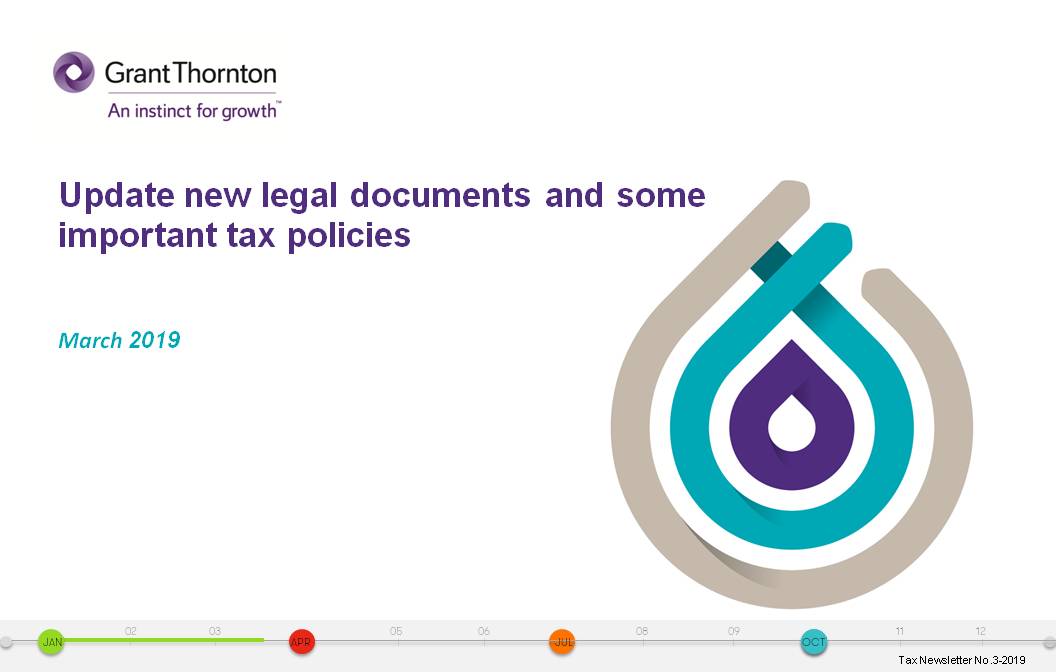In this newsletter, Grant Thornton Vietnam would like to update the important regulations and tax policies including:
Decree No. 13/2019/ND-CP on science and technology enterprises
The Government issued Decree No.13/2019/ND-CP dated 01 February 2019 (“Decree 13”) providing some preferential treatments for science and technology enterprises such as Corporate Income Tax (“CIT”) reduction and exemption, credit incentives, and exemption or reduction in rental fees for land use right and water surface, etc.
Decree 13 will come into effect on 20 March 2019. Accordingly, this Decree applies to the organizations incorporated under Vietnamese laws specialized in science and technology activities.
Under the guidance of this Decree, enterprises need to meet the following requirements to be granted with the Certificate of science and technology enterprise:
a) Being established and registered under the Law on Enterprise;
b) Being able to create or apply scientific and technological achievements which are evaluated, appraised and recognized by competent authorities according to current regulations;
c) Generating revenue from production and trading of products, goods from scientific and technological achievements accounting for at least 30% of the total revenue.
Of note, the newly established enterprises of less than 5 years only have to meet the conditions (a) and (b) mentioned above to be certified as science and technology enterprises.
Decree 13 mentions CIT incentives applied to science and technology enterprises including tax exemption for 4 years and 50% reduction in payable CIT for the next 9 years (given that the condition of revenue generated from production and trading of products, goods from scientific and technological achievements accounting for a minimum rate of 30% of the total revenue of the enterprise is met).
In addition to tax incentives, this Decree also stipulates other incentives that science and technology businesses will be entitled to including exemption or deduction of rental fees for land use right, credit incentives (preferential loans with a maximum reduction of 50% in interest rates from commercial banks).
Accounting regimes of extra-small enterprises
The Ministry of Finance issued Circular No. 132/2018/TT-BTC dated 28 December 2018 ("Circular 132") providing guidance on accounting regimes of extra-small enterprises. To be specific, the Circular provided guidance on recording accounting books, system of accounting forms, accounting reports and structure of accounting team, etc. Criteria being extra-small enterprises are determined according to the current tax regulations.
This Circular enters into force from 15 February 2019 and applies to the financial year starting on or after 01 April 2019.
Tax implication on technology transfer
On 20 November 2018, the General Department of Taxation issued Official Letter No. 4574/TCT-CS guiding the tax treatment on transferring "technical information" from foreign enterprise to Vietnamese enterprise.
In particular, based on this Official Letter, the transfer of "technical information" is considered technology transfer and is governed by the provisions of the Law on Technology Transfer.
According to the current regulations, only technology owners or organizations and individuals authorised by technology owners can conduct the technology transfer. Accordingly, in the case of transferring technology from a foreign enterprise to a Vietnamese enterprise, if the foreign laws do not require the foreign enterprise to register its ownership right of the technology, the Vietnamese enterprise is responsible for providing dossiers and documents or making commitment to proving that the foreign enterprise is the owner of the technology.
The Official Letter No. 4574 clarified the previous discussion in Official Letter No. 231/TCT-CS dated 15 January 2018 of the General Department of Taxation on this issue.
Electronic invoices with or without attachment of list of goods?
On 18 January 2019, Hanoi Tax Department issued Official Letter No. 2973/CT-TTHT on preparing a list of goods attached with electronic invoices (e-invoice).
According to Hanoi Tax Department, if the Company issues an e-invoice to a customer when selling goods, the Company must mention a full list of goods sold to ensure that the information on the e-invoice can be accessed to and used in complete forms in accordance with the Law. Therefore, this list of goods sold must be mentioned directly on the e-invoice, not in the attachment.
In case the Company converts e-invoices into paper ones, if the list of goods and services sold is longer than the lines available on one page of the invoice, the company will do the same as using self-printed invoices. To be specific, the company may have a more-than-one-page invoice, provided that the invoice number (generated by computers), name, address, and tax code of the buyer on the second page are same as those on the first page, and the text “tiep theo trang truoc – trang X/Y” (continued from previous page - page X/Y) (therein X is the current page, Y is the total number of pages of the invoice) must be stated.
CIT incentives on deposit interest during the investment stage
Hanoi Tax Department issued Official Letter No. 4102/CT-TTHT dated 24 January 2019 providing guidelines on CIT incentives on deposit interest in the investment stage of the company.
According to the guidance of Hanoi Tax Department, if the company sufficiently meets the requirements for tax incentives in accordance with the regulations at the time of being granted with the Investment License to establish the enterprise, then the entitlement period of CIT incentive rate is calculated from the time when the company actually commences its operation even though the Company has earned deposit interest income from capital contributed by investors deposited at the bank during the investment period. Income from deposit interest earned in the stage of construction investment must be declared and relevant CIT must be paid. This is not included in the entitlement period of CIT incentives (including the entitlement period of preferential CIT rate, CIT exemption and reduction).
Please contact our professional advisors at Grant Thornton Vietnam for assistance with taxation, accounting, transfer pricing, labour, investment and customs as well as other legal issues you may have during your business operation.




